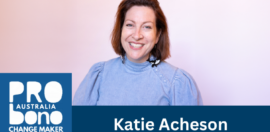Why Complexity and Collaboration Go Together
17 April 2013 at 11:05 am

 If we are successful at solving some social challenges, why is it we have limited success in solving the complex ones and how can Collective Impact help asks Australian social change advocates Dawn O’Neil AM and Kerry Graham.
If we are successful at solving some social challenges, why is it we have limited success in solving the complex ones and how can Collective Impact help asks Australian social change advocates Dawn O’Neil AM and Kerry Graham.
In Australia, we have a proud tradition of caring for those who face economic and social disadvantage. We also have a strong track record of tackling public health challenges such as workplace injury, smoking and drink driving. But there are some challenges where we simply have been unable to make change despite billions of dollars spent and countless programs delivered.
If we are successful at solving some social challenges, why is it we have limited success in solving the complex ones? And by complex we mean challenges such as homelessness, mental illness, obesity and other social disadvantage that cost Australia billions of dollars and untold distress every year.
David Snowden, an academic of complexity theory, might proffer that one reason why we are not as successful at solving complex problems is that we bring the wrong type of response to them. In his decision-making framework – the Cynefin framework – Snowden provides a way for decision makers to make sense of the type of ‘systems’ they are responding to.
For example, in a simple system, cause and effect is known and predictable. The decision model is Sense – Categorise – Respond and the most appropriate response is to apply best practice. Snowden is quick to point out that the only place to apply best practice is in simple systems. Best practice won’t work in complicated, complex or chaotic systems.
So what can Snowden’s Cynefin Framework teach us about solving our most complex social challenges? Snowden defines complex systems as ones where the relationship between cause and effect can only be perceived in retrospect, not in advance. In this case the decision making model is Probe – Sense – Respond and the most appropriate response is to apply emergent practice, or experiments.
If experiments start to work they should be amplified; if they start to fail they should be dampened. Snowden stresses the importance of determining the amplification and dampening strategies in advance of undertaking any experiments.
A very valid question here is how do we decide what ‘experiments’ we should try in complex systems? Snowden and the grandfather of ‘wicked’ problems – Horst Rittel – recommend collaboration.
Rittel provided the following stepped guide as to why solving wicked problems requires collaboration:
- Simple problems (problems which are already defined) are easy to solve, because defining a problem inherently defines a solution.
- The definition of a problem is subjective; it comes from a point of view. Thus, when defining problems, all stakeholders, experts, and designers are equally knowledgeable (or unknowledgeable).
- Some problems cannot be solved, because stakeholders cannot agree on the definition. These problems are called wicked, but sometimes they can be tamed.
- Solving simple problems may lead to improvement—but not innovation. For innovation, we need to re-frame wicked problems.
- Because one person cannot possibly remember or keep track of all the variables (of both existing and desired states) in a wicked problem, taming wicked problems requires many people.
- These people have to talk to each other; they have to deliberate; they have to argue.
- To tame a wicked problem, they have to agree on goals and actions for reaching them. This requires knowledge about actions, not just facts.
- Science is concerned with factual knowledge (what-is); design is concerned with instrumental knowledge (how what-is relates to what-ought-to-be), how actions can meet goals.
- The process of arguing is the key and perhaps the only method of taming wicked problems.
- This process is political.
Over the last two years, we have been exploring and growing the field of Collective Impact in Australia. Collective Impact is a structured framework for successful collaborations, particularly effective for tackling complex, place based, social problems.
We have learnt and seen that there are some outstanding examples of Australian collaboration to solve complex social challenges – the work of United Way and Pathways to Prevention are two examples that easily come to mind.
However, we have also experienced and seen an entrenched resistance to collaboration. A better understanding of the nature of the problems we are tackling and an appropriate process for approaching these problems is essential.
We believe the Collective Impact framework delivers both. Collective Impact provides an opportunity for resistance to be reduced so that we may thoughtfully support emergent problem solving and decision needed to make progress in social challenges we have been unable to solve.
About the authors: Dawn O’Neil AM and Kerry Graham have just undertaken a Collective Impact study tour in the USA on behalf of the Centre for Social Impact. Their vision is to translate Collective Impact into the Australian context.








As a regional Partnership Broker with Sydney Business Education Partnerships (Sydney BEP); one of approx 150 organisations across Australia contracted to facilitate DEEWR’s Schools Business Community Partnership Broker program, I read ‘Why Complexity and Collaboration Go Together’ article with great interest.
I agree with the authors that Australia has traditionally resisted collaboration. However, now in its’ 4th year of operation, the Partnership Brokers Program is beginning to enjoy greater reception to collaboration and partnership in addressing complex, place based, social problems.
For more on this program and the collaborations/partnerships being undertaken by Partnership Brokers across Australia visit
http://transitions.youth.gov.au/sites/transitions/successstories/pages/partnershipbrokerssuccessstoriesrollup
https://www.facebook.com/PartnershipBrokers